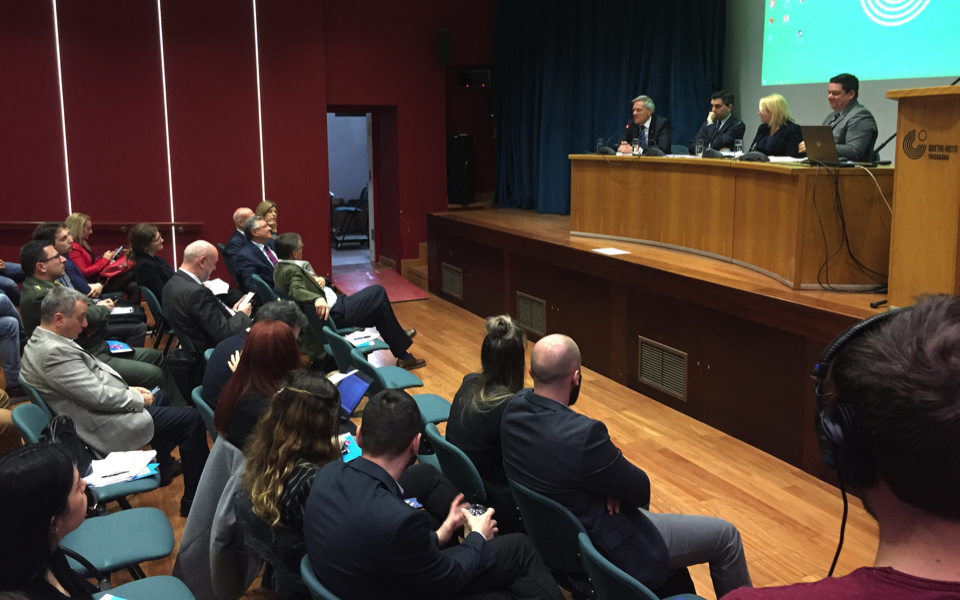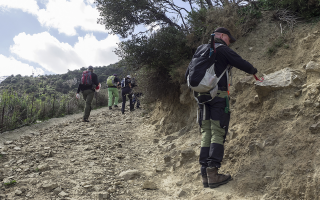Southeastern Europe and Germany in the 21st century

Henry Kissinger famously once said that Germany is too big for Europe but too small for the world. Today, considerable changes to the international balance of power mainly due to the emergence of systemic multipolarity raise the question of European leadership giving a new dimension to Kissinger’s old quote. This emerging role was the theme of the Greek-German Regional Policy Symposium, titled “Southeastern Europe and Germany in the 21st Century: New Roles and Narratives for a New Era.”
The symposium, organized by the Greek office of the liberal Friedrich Naumann Foundation for Freedom and the University of Macedonia’s Department of International and European Studies with the support of the General Consulate of Germany in Thessaloniki, recently took place at the Goethe Institute in Thessaloniki. The panels covered various aspects, establishing a coherent analytical framework on the fundamentals of European and German foreign policy.
The well-attended symposium began with a panel of politicians. Juliana Nikolova, a North Macedonian lawmaker with the Liberal Democratic Party (LDP), underlined the mutual understanding between the two governments on the Macedonia name issue, evaluating the Prespes agreement as a very positive step not only for the Balkans but for the whole of Europe. From the Greek side, New Democracy MP Christos Dimas expressed the opposite view, claiming that it is an unsatisfying agreement that failed to eliminate irredentism. Moreover, he distinguished North Macedonia’s European path from the Prespes agreement, stating that European Union accession should be based merely on factual progress. For his part, the German consul general in Thessaloniki, Walter Stechel, argued that from the German perspective the Balkans should be integrated into Europe for both historical and strategic reasons. However, he stressed that not all institutional structures are as robust as required so Germany has to help as much as possible, especially concerning issues such as smuggling, human trafficking and drugs.
Two distinguished historians at the University of Macedonia (UoM) reviewed Germany’s role in Southeastern Europe in the post-Cold War era: Professors Stratos Dordanas and Vlasis Vlasidis said that knowledge of the past is the first and foremost step in establishing good relations. They cited critical cases such as the status of the German unknown soldiers (unbekannten Soldaten) buried in Greece to highlight the role of Track II diplomacy. Professor Marie-Janine Calic, of Munich’s Ludwig Maximilian University, said that Germany’s proximity to the region explains its given interests. Nevertheless, lessons from the past call for a patient and diplomatic approach, shaping a normative and value-based orientation for the country’s foreign policy: Germany has a strong commitment to participating in alliances to protect against any kind of problems. In support of this view, Professor Revecca Pedi (UoM) added that Germany is in favor of multilateralism and a reliable partner in the region.
Regarding economic prospects, Professor Christos Nikas (UoM) used the “gravity model” to explain the economic interconnection of Germany with the Balkans. He said that Germany is a major partner for trade and investments, although relations have been undermined due to political developments. In the same panel, moderated by Tom Ellis, editor in chief at Kathimerini English Edition, Dr Jens Bastian, a former member of the European Commission’s Task Force for Greece and now an independent economic consultant, noted that Greece is stabilizing its “reputational capital,” adding that this explains why Germany outdistances all other countries in investments.
On the security challenges in Southeastern Europe, Professor Mustafa Aydin, president of the International Relations Council of Turkey, pointed to the role of NATO, while Professor Ilias Kouskouvelis (UoM) said that the North Atlantic Alliance has both bright and dark sides of intervention in the region. Gunter Seufert, of the German Institute for International and Security Affairs, highlighted the different views held by Germany and the US about NATO, and Velizar Shalamanov, director of the Institute of Information and Communication Technologies at the Bulgarian Academy of Sciences, supported regional cooperation under NATO and an agreement between Germany and France that could facilitate Europe’s military capabilities.
The symposium ended with a panel dedicated to policy suggestions for the German government. Professor Harry Papasotiriou, chairman of the Department of International, European and Area Studies at Panteion University and director of the Institute of International Relations in Athens, said that Germany should focus also on geopolitics, especially now that the UK is leaving the EU: That means enlargement in the Western Balkans and a special relationship with Turkey. Professor Spyros Litsas, of the UoM and academic supervisor of the Greek-German Regional Policy Symposium, suggested that Germany be the EU leader for the transatlantic narrative and lead the way in confronting Russia’s sharp power. German Consul General Stechel pointed out that the EU, as it is constituted, cannot be under the dominion of one country. Nevertheless, she added, Germany can send a clear message for common defense and think beyond the international system.
Dr Athanasios Grammenos is a political scientist at the University of Macedonia.





